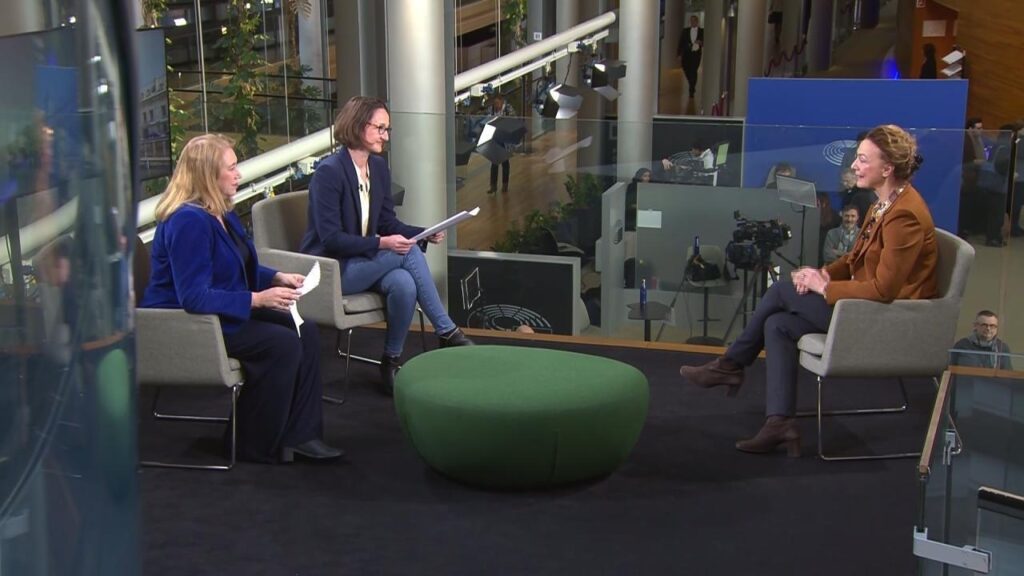Published on :
The Council of Europe is an institution ensuring respect for human rights, which have been particularly violated and called into question on our continent recently. It celebrates its 75th anniversary in 2024 and brings together, beyond the Twenty-Seven, 46 member states. In this year of European elections, we welcome its Secretary General, the Croatian Marija Pejcinovic Buric, who ends her five-year mandate in 2024. She tells us about Russia’s exclusion from the Council of Europe, aid to Ukraine, facilitated by the damage register that her institution has put in place, the war between Israel and Hamas, but also freedom of the press, which must “be protected if we want to safeguard democracy”.
On March 16, 2022, the Council of Europe excluded Russia, which had been a member for 26 years. A first in the history of this institution. But for Marija Pejcinovic Buric, after the invasion of Ukraine, “there was no other possibility than to exclude Russia (…), which has long violated Council of Europe standards “, notably “with the attacks against Georgia in 2008 or the illegal annexation of Crimea in 2014”.
The Council of Europe subsequently created a register of damages for compensation for victims of the war in Ukraine, adopted by 43 of the 46 members (with the exception of Hungary, Serbia and Turkey), “the only instrument legally binding for Russia’s responsibility for the crimes committed against Ukraine”, says Marija Pejcinovic Buric, even if she concedes that it will be “very difficult legally” to force Russia to actually pay the sums owed. “The idea was to reach an expanded partial agreement in order to open up the possibility of an alliance beyond the Council of Europe. (…) All the G7 states are members. We are already present on three continents. We hope to have more members.”
On October 7, 2023, the Secretary General of the Council of Europe was among those who immediately condemned Hamas’ “inhumane and horrific” attack on Israeli territory: “It is true that Israel has the legitimate right to defend ourselves, but it is also true that we cannot accept the suffering that Palestinians endure every day.” She therefore calls “for a peace process which unfortunately has dragged on for a long time, but which in my opinion is the only way to get out of this infernal circle with far too many victims on both sides.”
Marija Pejcinovic Buric insisted on the adoption of guidelines regarding the use of artificial intelligence, particularly in journalism, to combat disinformation. She fears that the development of technology will go “against human rights, democracy and the rule of law. (…) The European Convention on Human Rights must apply in new conditions and we are in the process of negotiating an agreement on the entire life cycle of artificial intelligence (…) with actors outside Europe, very powerful and very important: all countries from North America, most countries in South America, several in Asia, e.g. Japan, South Korea: around 90 countries and civil society representatives are also involved.”
At the same time, “we must safeguard quality journalism if we want to safeguard democracy (…) and we see in Europe, but also elsewhere, that journalists are increasingly either physically attacked, or intimidated, or certain laws are changed: many methods are used to reduce the space for media freedom and the safety of journalists, of women journalists who are very often or more often attacked, especially online, and who must be protected” , she insists.
Next June the European elections will be held to elect 720 deputies for five years. Marija Pejcinovic Buric regrets that “fewer and fewer people are participating in elections and that there is a fear or discomfort with democratic institutions: voting is not only a right, but also a responsibility.”
For personal reasons, she will not run for a second term. From her five years at the head of the Council of Europe, she remembers the Covid pandemic “for which no one was prepared”, the exclusion of Russia, “the largest state in the world”, as well as the “democratic setback that Europe must face”.
Three men are in the running to succeed him: the Belgian Didier Reynders, current European Commissioner for Justice, the Swiss Alain Berset, who was President of the Swiss Confederation in 2018 and 2023, and the Estonian Indrek Saar, former Minister of Culture . Marija Pejcinovic Buric half-heartedly regrets that there are no women: “When I presented myself five years ago, there was gender equality, we were two women and two men. And I was very happy because the Council of Europe, which is trying to push for gender equality, was not the champion itself. Only one woman, Catherine Lalumière, had until then led the Council of Europe. Europe. (…) That should change and the fact that we have three men now doesn’t help.”
She underlines “the importance” of the fight against violence against women and domestic violence “a universal scourge still in the 21stᵉ century” and on the fact that her successor “must also tackle these issues”, by ensuring respect for the Istanbul Convention, “because there is no better standard in the world”, she concludes .
Program prepared by Isabelle Romero, Perrine Desplats and Sophie Samaille

